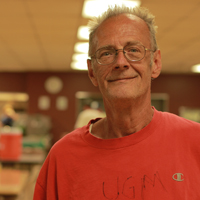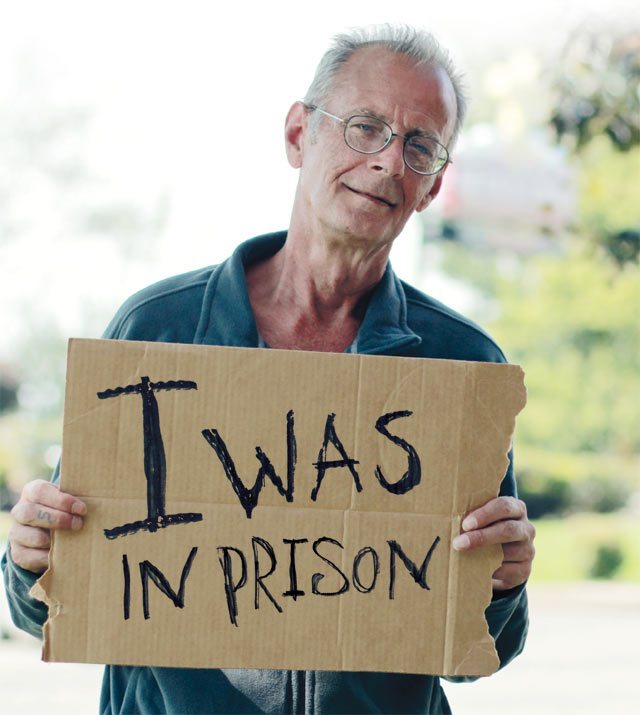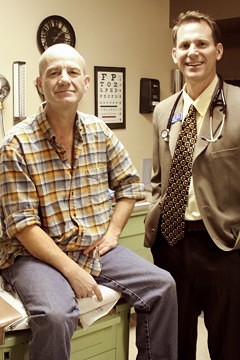2 min read
Gospel-Centered from the Start
“Let us hold unswervingly to the hope we profess, for He Who promised is faithful…Jesus Christ is the same yesterday, today, and forever.” (Hebrews...

Paul folded his lanky frame into one of the red chairs in my small office. I sat in the other, our knees less than a foot apart. He was wearing a baggy white t-shirt with “UGM” scrawled across the chest in black Sharpie, white shorts, white socks and white, slip-on sandals. The ensemble made him look a bit like a hospital patient . . . or a prisoner. Dark green ink covered his forearms in abstract patterns, blurring in places into bruise-like blotches. His beard had the scruffy look of two or three days’ worth of growth, and his cheeks were sunken in like a man who has no teeth.
Paul is 61 but looks older, fragile, completely non-threatening. He’s undergone two bouts of cancer – kidney and colon – and the chemotherapy nearly finished him off, but it’s more than that. Paul’s entire demeanor conveys gentleness. His speech is polite and deferential, addressing me as “ma’am.” I don’t know what I was expecting. I’ve never met someone convicted of first-degree murder before. But I wasn’t expecting this. I really liked him.
In addition to interviewing Paul for the October issue of Mission News, I did a lot of reading on prison and the transition back into society.

I read about the prison in Walla Walla where Paul was sent in 1975. A reporter for the Spokane Daily Chronicle wrote this in May 1975: “Though reform was supposed to provide a more civilized atmosphere inside the walls, murders are on the increase.” During a riot in March, “One inmate said, ‘You never saw so many shanks in your life.’”
Paul was just 22 years old when he arrived at the Washington State Penitentiary: “I was scared to death. Anybody back then, in the 70’s in Walla Walla, if they said they weren’t scared, they’re lying. It was a very dangerous prison.” He described being given a ball peen hammer and ice pick by another inmate and told, “Look, you don’t have to worry about getting shook down. You just have to worry about staying alive.” Paul stuck the tools into the waistband of his underwear.
Prior to going to prison, Paul described himself as a “peace-loving man.” His conviction for murder was based on the fact that Paul was involved in the drug deal that led to the murder.
What I Read
I had to do a little research in order to understand how a man could spend 37 years in prison for a crime he didn’t commit. I read this in the transcripts of one of the trials related to Paul’s crime:
"Under the laws of this State every person concerned in the commission of a crime, whether he directly commits the act constituting the offense, or aids or abets in its commission, and whether present or absent, and every person who directly or indirectly counsels, encourages, induces or otherwise procures another person to commit a crime, is a principal and shall be proceeded against and punished as such.
"Where two or more persons engage in a common criminal escapade, and all are immediately present at the scene of a crime, the acts of one are the acts of each of the others.
"It is further well settled that, if two or more combine together to commit an unlawful act, such as robbery, and, in the execution of the criminal act, a homicide is committed by one of the actors, as a probable or natural consequence of the acts done in pursuance of the common design, all present participating in the unlawful undertaking are as guilty as the one who committed the fatal act." (Source)
Paul was admittedly involved in the drug deal. By law, that made him guilty of the murder that happened during the course of the crime.
That didn’t seem fair to Paul. “I remember when I was in county on that murder charge. I thought that if I got close to God, made friends with God, that I might get charged with sales or whatever, but not murder. I’d never even carried a weapon. Like I said, I was a hippie. And when I did get convicted, I blamed God.” Paul turned his attention to survival and prison ethics.
Prison, in and of itself, didn’t make Paul a better man. Just the opposite. “I remember getting in quite a few battles with that hammer and ice pick.” Paul became a violent man, a man to be feared.

Paul with one of UGM's most amazing volunteers, Shelley Altmeyer
And here’s where I'm going to ask you to make what might seem like a gargantuan leap.
Paul, the ex-felon, and Paul, the apostle, have a lot in common. Consider this passage from Acts 9:
13 “Lord,” Ananias answered, “I have heard many reports about this man and all the harm he has done to your holy people in Jerusalem. 14 And he has come here with authority from the chief priests to arrest all who call on your name.” 15 But the Lord said to Ananias, “Go! This man is my chosen instrument to proclaim my name to the Gentiles and their kings and to the people of Israel. 16 I will show him how much he must suffer for my name.” 17 Then Ananias went to the house and entered it. Placing his hands on Saul, he said, “Brother Saul, the Lord—Jesus, who appeared to you on the road as you were coming here—has sent me so that you may see again and be filled with the Holy Spirit.” 18 Immediately, something like scales fell from Saul’s eyes, and he could see again. He got up and was baptized, 19 and after taking some food, he regained his strength."
Like Paul Staley, Paul the Apostle was a violent man, a man to be feared, especially by early Christians. Like Paul the Apostle, Paul Staley met God in a supernatural way, and the encounter changed him forever.
In the middle of a prison riot, “God, for whatever reason, just turned me around and sent me back to my cell…I dusted off that Bible and I started reading it.” During the 40-day lockdown following the riot, “God took me from the beginning of the Bible to the end…It took a long time for me to come to Christ, but in 1996, I repented of my sin, and I started walking after God.
“God slayed my old nature and gave me a new life and a heart after him. My heart was stone cold, and now my heart is flesh, and it loves to love. It doesn’t hate others. It doesn’t resent others or want what others have. God changed me.”
Paul Means Humble
After “gentle,” the second word I would use to describe Paul is “humble,” the Latin meaning of his name. He looks at the remainder of his life as an opportunity to serve. His good friend Shelley Altmeyer, a UGM volunteer who spends hours upon hours visiting with men in the day room, described Paul like this: "He really has a love for people and a sense of knowing what to say in a way that validates. He is a safe person for wounded people. Everyone loves him."
As horrifying as his past has been, Paul wouldn't change it. He knows God used it to make him who he is. “Well, you see,” Paul said, “A lot of people find good in themselves, good characteristics, and so, you know, they might have alcoholism or a drug addiction or sexual whatever, but they don’t see themselves as being bad. But I’ve been altogether bad, and so I know . . . My experience in life has taught me that there is no good thing in me, and that the old man has to be put away.
“I regret my sins, but I’m thankful that in spite of my sins I have a new life. My greatest joy today is helping others. I just love waking up in the morning ‘cuz I know God’s gonna give me the opportunity to talk about Him.”
I think the thing I wasn’t expecting was that, when I sat down with Paul, I sat down with Christ.
~Barbara Comito, UGM staff writer

2 min read
“Let us hold unswervingly to the hope we profess, for He Who promised is faithful…Jesus Christ is the same yesterday, today, and forever.” (Hebrews...

9 min read
To celebrate 75 years of serving the Inland Northwest, we are spending the year remembering our history and the faithfulness that built us and...

2 min read
In 2026, Union Gospel Mission Inland Northwest is approaching our 75th Anniversary! This is a milestone that invites gratitude and reflection, and...

I was in prison and you gave me a second chance. Paul Staley was a self-described “peace-loving man.” A product of the sixties. A flower child. A...

Paul Stankiewicz, who was featured on the cover of the August 2013 Mission News, was recently baptized in the Spokane River at Harry Altmeyer Park,...
 Read More
Read More